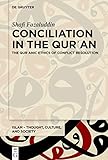Conciliation in the Qurʾan : The Qurʾanic Ethics of Conflict Resolution / Shafi Fazaluddin.
Material type: TextSeries: Islam – Thought, Culture, and Society ; 9Publisher: Berlin ; Boston : De Gruyter, [2022]Copyright date: ©2022Description: 1 online resource (XIII, 241 p.)Content type:
TextSeries: Islam – Thought, Culture, and Society ; 9Publisher: Berlin ; Boston : De Gruyter, [2022]Copyright date: ©2022Description: 1 online resource (XIII, 241 p.)Content type: - 9783110747201
- 9783110747461
- 9783110747348
- online - DeGruyter
- Issued also in print.
| Item type | Current library | Call number | URL | Status | Notes | Barcode | |
|---|---|---|---|---|---|---|---|
 eBook
eBook
|
Biblioteca "Angelicum" Pont. Univ. S.Tommaso d'Aquino Nuvola online | online - DeGruyter (Browse shelf(Opens below)) | Online access | Not for loan (Accesso limitato) | Accesso per gli utenti autorizzati / Access for authorized users | (dgr)9783110747348 |
Browsing Biblioteca "Angelicum" Pont. Univ. S.Tommaso d'Aquino shelves, Shelving location: Nuvola online Close shelf browser (Hides shelf browser)

|

|

|

|

|

|

|
||
| online - DeGruyter A Grammar of Coastal Marind / | online - DeGruyter Herbartism in Austrian Philosophy / | online - DeGruyter Complementary Democracy : The Art of Deliberative Listening / | online - DeGruyter Conciliation in the Qurʾan : The Qurʾanic Ethics of Conflict Resolution / | online - DeGruyter Orationes funebres I : In psalmum 61 / De obitu Gratiani. De consolatione Valentiniani / De obitu Valentiniani De obitu Theodosii / | online - DeGruyter Kant in Österreich : Alois Riehl und der Weg zum kritischen Realismus / | online - DeGruyter Philosophy Examined : Metaphilosophy in Pragmatic Perspective / |
PhD. University of London 2020.
Frontmatter -- Acknowledgements -- Contents -- Notes -- Introduction -- Conciliation in Context -- 1 Conciliation Discourse and Conflict Management Systems -- 2 Conciliation and Conflict in the Meccan and Medinan Qurʾan -- 3 The Notion of Iḥsān in Conflict Resolution -- 4 Conciliation Models and Conciliatory Appeal -- 5 Conciliation in Theory and Practice -- 6 Prophetic Disengagement and Social Justice -- Summary Table: Groups 1–7 Conciliation Map of Key Themes -- Final Conclusion -- Bibliography -- Index
restricted access online access with authorization star
http://purl.org/coar/access_right/c_16ec
Conciliation in the Qurʾan addresses an existing imbalanced focus in Islamic Studies on conflict in the Qurʾan, and moves beyond a restrictive approach to ṣulḥ (reconciliation) as a mediation process in fragmented social contexts. The book offers a critical analysis of conciliation as a holistic concept in the Qurʾan, providing linguistic and structural insight based on the renowned pre-modern Arabic exegesis of Al-Rāzī (d. 1209) and the under-studied contemporary Urdu exegesis of Iṣlāḥī (d. 1997). This ambitious thematic study of the entire Qurʾan includes an innovative examination of the central ethical notion of iḥsān (gracious conduct), and a challenging discussion of notorious passages relating to conflict. The author offers solutions to unresolved issues such as the significance of the notion of iṣlāḥ (order), the relationship between conciliation and justice, and the structural and thematic significance of Q.48 (Sūrat Al-Fatḥ) and Q.49 (Sūrat Al-Ḥujurāt). Conciliation in the Qurʾan offers a compelling argument for the prevalence of conciliation in the Islamic scripture, and will be an essential read for practitioners in Islamic studies, community integration, conflict-resolution, interfaith dialogue and social justice.
Issued also in print.
Mode of access: Internet via World Wide Web.
In English.
Description based on online resource; title from PDF title page (publisher's Web site, viewed 28. Feb 2023)


